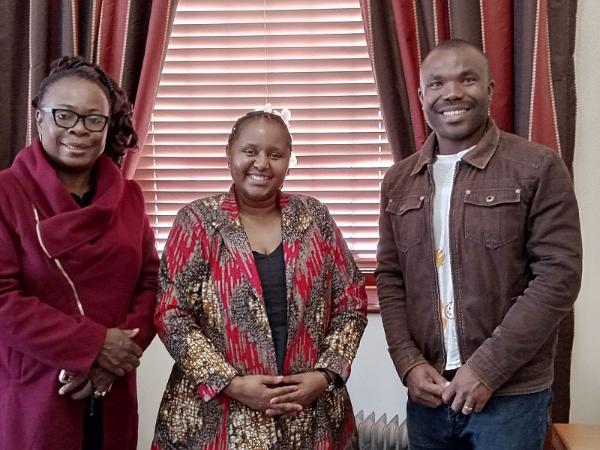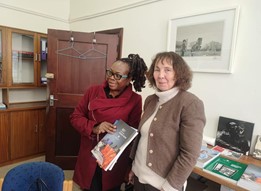
Author: Chukwuemeka Victoria.I. Ph.D
Designation: Visiting Research Scholar (AWaRMN)
Institution: Federal University of Technology, Minna,Nigeria.
My visit to the Deputy Vice Chancellor for Research innovation and strategic partnership, Rhodes University, South Africa was quite remarkable.
The DVC, Dr. Nomakwezi Mzilikazi warmly welcomed us and expressed so much delight in seeing me and knowing that I am from Federal University of Technology, Minna,Nigeria. She expressed desire to further the collaboration between Rhodes and FUT, Minna.
Based on our interaction this morning, she requested for areas of strength in FUT, Minna that Rhodes can work with us on. She said she wanted the relationship between the two universities to transcend beyond just individual departments to Institutional.
As a fall out from this visit, I have identified the following areas where partnership between the two Universities can actually go a long way. They include the following:
- Water is one major area where we still need a very strong collaboration since the food from arid farming can no longer meet the demand for food. A lot of attention is being paid to our Fresh water and Marine water ecosystems to see how we can have very good supply of pipe borne water since most of our water bodies are not safe for use due to several organic and inorganic pollutants. Take for example the oil spillage in the Niger Delta Regions, this need to be quantified as this will help us know the level of harm it is causing.
- Also we need new statistics as most of the statistics generated years back need to be updated.
- We equally need research in this area to start focusing on Bioremediation activities that can help to mitigate oil drills in Niger Delta so as to safe guard the health of people living around those areas and Nigeria generally. As a way of addressing this problem, in Nigeria recently, the Ministry of Blue Economy has been established to help see how we can harness more food resources from the wild.
- Flooding is another major problem in Nigeria. This also come under water. In fact, every year it wreaks havoc. Alot of Farmers have been given a lot of loans from the bank to help them provide more food for the populace as a way of solving the food insecurity issues but this flood clears everything. We can deploy some techniques through Mechatronics Engineering departments to help salvage the situation.
- Climate change is currently a global challenge which extensively impacts our water bodies. We currently have the West African Science for Climate Change and Adapted Land Use (WASCAL) situated in FUT, Minna. It is designed to encourage cross boarder collaboration in education and research. This center calls for researches that can generate data and give vital information from base line studies that can generate predictor information and ultimately eco setting resilient researches.
- The area of food security is another major area, since the impact of the Covid era is still very much in place. Researches that center around how to produce more food, in terms of improved varieties and storage viabilities and studies on how to improve the value chain of processed food and other raw materials is another area we can actually collaborate in. Currently the African centre of excellence for Mycotoxin and food safety is located in FUT, Minna. This is another strong area where partnership can be established.
- Another area which is very strong in FUT, Minna is the Information and Communication System which has recently been redesigned and packaged through ICT. Here Soft wares that can address some of the challenges of insecurity in our country and others can be developed.
- Talking about Humanities, our Entrepreneurship department is very vibrant. We currently have programes from undergraduate to masters and PhD level, where graduates are trained to be enterprising. Here they are equipped with Managerial skills through the Small to medium enterprises to make them self-reliant after graduation.
For me, the availability of sufficient food and portable drinking water as a way of achieving the Sustainable Development Goals (SDG) for our collective future as Africans should be given Top Priority through collaborative innovative research.
On this note I sincerely want to appreciate the DVC, Research innovation and strategic partnership for a very warm reception and extending a hand of fellowship. In fact, such collaborations will also help to improve the visibility of both institutions

Dr. (Mrs) Chukwuemeka Victoria (Visiting Scholar FUT Minna Nigeria) with Jaine Roberts (Director Rhodes University Research Office)
Also this afternoon I was privileged to meet with Jaine Roberts, Director Rhodes University Research office. It was another very warm Reception. I must confess that the people at Rhodes University are very hospitable. She gladly received me and wanted to know what my visit was all about, which I gladly told her. She gifted me with some books on the research report for Rhodes University and one of her books titled “The Flanagan Journey, The Extraordinary South African Women”. We also had a snap shot together. I went in the company of the Director, Institute for water research (IWR), Prof Nelson Odume and Dr Chika Nnadozie.
I am so grateful to the African Water Resources Mobility Network (AWaRMN ) funded by the Intra–Africa Academic Mobility Scheme of the European Union for giving me this privilege to visit a sister African Country for the First Time.
